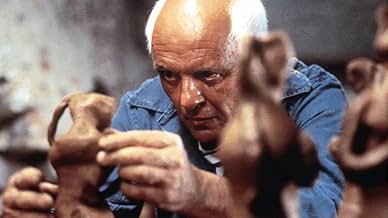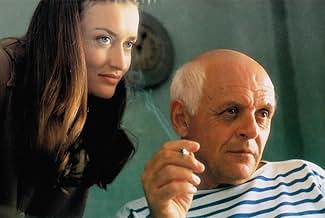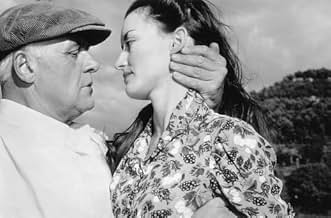IMDb-BEWERTUNG
6,3/10
8096
IHRE BEWERTUNG
Das passionierte Drama von Merchant Ivory erzählt die Geschichte von Francoise Gilot, der einzigen Geliebten Picassos, die stark genug war, seine grausame Härte auszuhalten und ohne ihn weit... Alles lesenDas passionierte Drama von Merchant Ivory erzählt die Geschichte von Francoise Gilot, der einzigen Geliebten Picassos, die stark genug war, seine grausame Härte auszuhalten und ohne ihn weiterzuleben.Das passionierte Drama von Merchant Ivory erzählt die Geschichte von Francoise Gilot, der einzigen Geliebten Picassos, die stark genug war, seine grausame Härte auszuhalten und ohne ihn weiterzuleben.
- Regie
- Drehbuch
- Hauptbesetzung
Allegra Di Carpegna
- Geneviève
- (as Allegra di Carpegna)
Empfohlene Bewertungen
It's a pity that many of the user comments on this movie are simply a vehicle for people's dislike of Picasso, and that they treat the film as though it were a documentary. Picasso may have been as sex-mad, egocentric, paranoid and capricious as any Hollywood star (think Chaplin); but first and foremost he was a prodigious artist, who transformed our view of visual art, and dealt with some of the great themes of western culture. And presumably it was those latter qualities which drew women to him, in the same way that women have been drawn to successful, powerful men of dubious character since the dawn of time.
The movie and Hopkins' performance are certainly successful in displaying Picasso's human weaknesses; but there is a failure to adequately convey Picasso's enormous creative power, a weakness compounded by the fact that the makers were not allowed to use much of his work in the film. I see the film as a well made, excellently acted, but partial (in both senses of the word) portrait of the artist. Its real focus is the women in his life, especially Francoise Gilot, and on the two-way exploitative nature of the relationship between a man of this kind and his mistresses/wives.
The movie and Hopkins' performance are certainly successful in displaying Picasso's human weaknesses; but there is a failure to adequately convey Picasso's enormous creative power, a weakness compounded by the fact that the makers were not allowed to use much of his work in the film. I see the film as a well made, excellently acted, but partial (in both senses of the word) portrait of the artist. Its real focus is the women in his life, especially Francoise Gilot, and on the two-way exploitative nature of the relationship between a man of this kind and his mistresses/wives.
A bio-pic on the life of artist Pablo Picasso focusing on his wilder side his rampant relationships with his many women, as seen from the perspective and understanding of the mother of many of his children Françoise Gilot.. We pick up the story where Gilot meets Picasso with the intention of becoming his student.
I was slightly interested in this film as it seemed to have a high quality cast. I must admit that I have little interest in art and have a very limited knowledge of the work and life of Picasso. However I was open to learning and I hoped this film would enlighten me in some way either in his work or his life. The film's focus is Picasso's private life rather than his work, this was an odd decision not to weave any of his work into the film in a significant way but it didn't put me off. What DID put me off was the fact that the film didn't involve me to the degree I had hoped it would. I'm not a consistent fan of Merchant & Ivory films simply because, unless they get it bang on (Remains of the Day) then they do leave me feeling a bit cold. Here that detached feeling was what I had the whole way through I never felt for any of the characters or situations and never really got involved in the film, it was simply on in the same room as I was sitting more than me watching it.
It's a shame because the film is beautifully made for all their faults, Merchant & Ivory films usually get that right. The sets and locations add to the film and are well shot. The cast is the main reason for watching this. Hopkins does very well in the lead and is running free for much of it. It confused me that I couldn't manage to link to his character maybe I was watching Hopkins act as opposed to seeing the character. It's ironic that his best performance for Merchant & Ivory was the total opposite of this in Remains of the Day (controlled, low key, subtle). McElhone is partly responsible for me not feeling involved in the film. I felt she was too cold, too emotionless and not expressive enough in the lead female role. Good support is given by Moore and others, and Ackland is good as Henri Matisse.
Overall this is not as awful or boring as some would have you believe Hopkins performance saves it from being that. But it did not involve me at all I was left quite cold to it even though the passion in Hopkins' performance made me think I was missing something. It's hard to put into words but this film doesn't manage to hold the interest not because of the subject, but more likely in the way it has been delivered.
I was slightly interested in this film as it seemed to have a high quality cast. I must admit that I have little interest in art and have a very limited knowledge of the work and life of Picasso. However I was open to learning and I hoped this film would enlighten me in some way either in his work or his life. The film's focus is Picasso's private life rather than his work, this was an odd decision not to weave any of his work into the film in a significant way but it didn't put me off. What DID put me off was the fact that the film didn't involve me to the degree I had hoped it would. I'm not a consistent fan of Merchant & Ivory films simply because, unless they get it bang on (Remains of the Day) then they do leave me feeling a bit cold. Here that detached feeling was what I had the whole way through I never felt for any of the characters or situations and never really got involved in the film, it was simply on in the same room as I was sitting more than me watching it.
It's a shame because the film is beautifully made for all their faults, Merchant & Ivory films usually get that right. The sets and locations add to the film and are well shot. The cast is the main reason for watching this. Hopkins does very well in the lead and is running free for much of it. It confused me that I couldn't manage to link to his character maybe I was watching Hopkins act as opposed to seeing the character. It's ironic that his best performance for Merchant & Ivory was the total opposite of this in Remains of the Day (controlled, low key, subtle). McElhone is partly responsible for me not feeling involved in the film. I felt she was too cold, too emotionless and not expressive enough in the lead female role. Good support is given by Moore and others, and Ackland is good as Henri Matisse.
Overall this is not as awful or boring as some would have you believe Hopkins performance saves it from being that. But it did not involve me at all I was left quite cold to it even though the passion in Hopkins' performance made me think I was missing something. It's hard to put into words but this film doesn't manage to hold the interest not because of the subject, but more likely in the way it has been delivered.
The movie is about Francoise Gilot, not about Picasso. It is not intended to tell Picasso's story. Picasso was brilliant, spectacular, the living center of the world of art and a sexual magnet. Women wanted him and, king that he was, Picasso viewed their adoration as no more than his due.
Francoise Gilot, a talented painter in her own right - but no Picasso - lives for ten years a life which for her is absolutely worth the pain. And when the pain is so grave that she will surely be overwhelmed, she stands up and leaves. The pain doesn't go away instantly, but it does go away, in time.
In one memorable scene, Gilot, at home with the baby, questions Picasso's absences, his obvious womanizing. He tells her in no uncertain terms that he will do as he chooses, that his life outside their home is none of her business. She has no right to question him. He doesn't say, "Take it or leave it," but that is the unmistakable message. She takes it, for a few more years, and another child.
It would be interesting to know whether Gilot, who was born in 1921 and is apparently still with us, harbors regret. I cannot imagine that she does. Of course she would have enjoyed that ten years better if Picasso had been able to love, in some recognizable way. But would she trade that life for one less magnificent? For one that would not be a good movie? Hardly.
The acting is of course perfect. Anthony Hopkins becomes the man Picasso. Natascha McElhone, Julianne Moore and Susanna Harker tell us the truth. Well paced, finely directed, this movie tells a riveting story. It is very, very good.
It is perhaps worthy of note that many of the negative reviews of this movie are written by men. Picasso was not just difficult; he was a Difficult Man.
Francoise Gilot, a talented painter in her own right - but no Picasso - lives for ten years a life which for her is absolutely worth the pain. And when the pain is so grave that she will surely be overwhelmed, she stands up and leaves. The pain doesn't go away instantly, but it does go away, in time.
In one memorable scene, Gilot, at home with the baby, questions Picasso's absences, his obvious womanizing. He tells her in no uncertain terms that he will do as he chooses, that his life outside their home is none of her business. She has no right to question him. He doesn't say, "Take it or leave it," but that is the unmistakable message. She takes it, for a few more years, and another child.
It would be interesting to know whether Gilot, who was born in 1921 and is apparently still with us, harbors regret. I cannot imagine that she does. Of course she would have enjoyed that ten years better if Picasso had been able to love, in some recognizable way. But would she trade that life for one less magnificent? For one that would not be a good movie? Hardly.
The acting is of course perfect. Anthony Hopkins becomes the man Picasso. Natascha McElhone, Julianne Moore and Susanna Harker tell us the truth. Well paced, finely directed, this movie tells a riveting story. It is very, very good.
It is perhaps worthy of note that many of the negative reviews of this movie are written by men. Picasso was not just difficult; he was a Difficult Man.
Anthony Hopkins is a very gifted actor,nobody can deny,but ,he was beginning to do any job going:playing Hannibal,Nixon and Picasso,it's much ,too much !Besides,James Ivory 's majestic talent ("Howards end" "remains of the day" "A room with the view" "Maurice") had inexorably waned."Jefferson in Paris" was already unsatisfying,smug and overblown.Still,it was entertaining."Surviving Picasso' is not.Only five minutes -let's be generous- are given over to the process of creation.The essential revolves around Picasso's relationship with women;this is neither rewarding nor entertaining,being trite,hollow and devoid of emotion , violence or/and tenderness.
Word to the wise:people interested in Picasso's art -which is more interesting than his private life!who cares?- should try to see Henri-Georges Clouzot 's "le mystère Picasso" (1956):Unlike Ivory,Clouzot films the REAL Picasso while he is creating.He paints on a sheet of glass and we can follow every lick of paint.
Word to the wise:people interested in Picasso's art -which is more interesting than his private life!who cares?- should try to see Henri-Georges Clouzot 's "le mystère Picasso" (1956):Unlike Ivory,Clouzot films the REAL Picasso while he is creating.He paints on a sheet of glass and we can follow every lick of paint.
I liked this movie quite a bit. It is not a very flattering portrait of the master, but it gives one insight into his art. Anthony Hopkins gives a convincing portrayal of the bad and the good qualities of the man. He had a charming playfulness about him which the women in his life fell for despite themselves and the knowledge of his reputation. Of course, his dark side was his maniacal desire for control of his women's lives, even after the romantic sides of their relationship had long since died. My question about those women is why they went out of their way to get into a relationship with him, knowing he had already ruined the lives of others. Francoise, the main character, thought herself strong enough to stave off any emotional harm he could do her, but when you get into a romantic relationship with someone, your reason disappears. Nobody's strong enough to not be hurt by someone they are emotionally involved with. The trick is to meet only the people who you feel reasonably sure will not do you harm. One would think an intelligent woman like Francoise would know that. If this were a piece of fiction, I would find it hard to believe, but given that the movie is based on fact.... This knowledge added a great deal to the intrigue of the movie, and a great deal of depth to the characters.
The acting is first-rate. I've seen a few of the other movies in which Natascha McElHone has acted, but those parts were not large enough to show her range. I was extremely impressed. She has a very expressive face, capable of portraying an entire pallet of emotions, and, most importantly, she is obviously an intelligent woman, capable of convincingly playing an intellectual. Of course, the fact that she is elegantly drop-dead gorgeous has not colored my emotions about her performance one bit.
Hopkins as usual does a brilliant job. I have never seen him express ebullience as he does here. He does a good job of showing how charming Picasso could be, supplying some motivation for why women fell for him, knowing his infamous past.
Seeing this movie lent new meaning to some of his paintings which I have seen recently. There is a portrait of Dorra Marr (sp?) in the Belissario Hotel in Las Vegas. One half of it portrays a happy woman, the other half is tinged with sadness. I now know the story behind this painting, making it all the more memorable. Like the first reviewer, I'm not a big fan of Picasso, but knowing what lies behind some of his paintings will add interest in the future.
The acting is first-rate. I've seen a few of the other movies in which Natascha McElHone has acted, but those parts were not large enough to show her range. I was extremely impressed. She has a very expressive face, capable of portraying an entire pallet of emotions, and, most importantly, she is obviously an intelligent woman, capable of convincingly playing an intellectual. Of course, the fact that she is elegantly drop-dead gorgeous has not colored my emotions about her performance one bit.
Hopkins as usual does a brilliant job. I have never seen him express ebullience as he does here. He does a good job of showing how charming Picasso could be, supplying some motivation for why women fell for him, knowing his infamous past.
Seeing this movie lent new meaning to some of his paintings which I have seen recently. There is a portrait of Dorra Marr (sp?) in the Belissario Hotel in Las Vegas. One half of it portrays a happy woman, the other half is tinged with sadness. I now know the story behind this painting, making it all the more memorable. Like the first reviewer, I'm not a big fan of Picasso, but knowing what lies behind some of his paintings will add interest in the future.
Wusstest du schon
- WissenswertesA few years after this movie, Sir Anthony Hopkins had already signed on to play Hannibal Lecter in Hannibal (2001), but Jodie Foster had declined. When director Ridley Scott let Hopkins know what actresses were being considered to play Clarice, Hopkins remembered how much he enjoyed working with Julianne Moore on this movie, and recommended her.
- Zitate
Pablo Picasso: I really like intelligent women. Sometimes, of course, I like stupid ones too.
Top-Auswahl
Melde dich zum Bewerten an und greife auf die Watchlist für personalisierte Empfehlungen zu.
- How long is Surviving Picasso?Powered by Alexa
Details
- Erscheinungsdatum
- Herkunftsland
- Offizielle Standorte
- Sprache
- Auch bekannt als
- Surviving Picasso
- Drehorte
- Produktionsfirmen
- Weitere beteiligte Unternehmen bei IMDbPro anzeigen
Box Office
- Budget
- 16.000.000 $ (geschätzt)
- Bruttoertrag in den USA und Kanada
- 2.021.348 $
- Eröffnungswochenende in den USA und in Kanada
- 87.054 $
- 22. Sept. 1996
- Weltweiter Bruttoertrag
- 2.021.348 $
- Laufzeit
- 2 Std. 5 Min.(125 min)
- Sound-Mix
- Seitenverhältnis
- 1.85 : 1
Zu dieser Seite beitragen
Bearbeitung vorschlagen oder fehlenden Inhalt hinzufügen
























